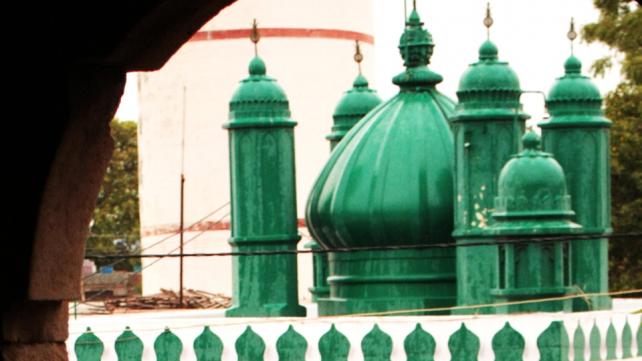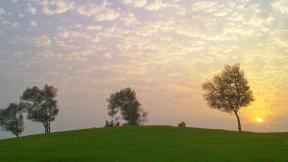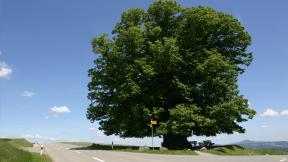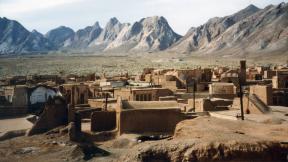
From the concrete jungles of Manhattan to the dusty deserts of Mali, Muslims across the world are building eco-mosques which show that caring for the planet is at one with the teachings of Islam. Arwa Aburawa investigates.
As focal points within Muslim communities, mosques are powerful places to spread the word about environmental issues and the need to care for the planet. And what better way to teach than through example? Building eco-mosques not only demonstrates the green roots of Islam but also helps to inspire the congregation to take practical steps towards more positive change.
Eco-construction in Cambridge In the UK, the city of Cambridge is leading the way with a state-of-the-art eco-mosque currently under development. Designed by the award-winning architects behind creations such as the London Eye and Kew Treetop Walkway, the 13-million project promises to be one of the most eco-friendly buildings in the city once it is completed. As well as graceful skylights to naturally light the mosque and water recycling facilities, the building will use ground source heat pumps which utilise the heat in the ground to warm the building. Bike racks will be provided for all those who travel in ‘green’ style and the community garden will be expanded to create a true oasis of calm around the mosque. The use of eco technologies, which make the most of what nature already provides, means that the mosque won’t have to rely on traditional energy sources which are generated using fossil fuels that damage the earth.
A vision of an environmentally-friendly mosque has led the community in Cambridge from the very start (it was a leading requirement in the design specifications) and was seen as an opportunity to highlight environmental issues and their link to Islam. Chairman of the Trust, Tim Winter, who is also known as Abdul Hakim Murad, said, “We are the ummah that respects nature and not just because if we ignore it our species will become extinct, but because God points us towards appreciating nature and His infinite signs. Traditionally, Islamic art and architecture reflected the beauty of nature through geometric patterns and arabesque, so I don’t think that we’re doing anything innovative here - I think we’re just reviving something which is very ancient.”
A Manchester mosque makeover
Whilst the eco-mosque in Cambridge is an ambitious project, it isn’t without precedent in the UK. In 2008 the Al-Markaz Al-Najmi mosque in Manchester (UK) was built using energy efficient glass, sustainable wood, reclaimed stone and was fitted with solar panels which generated energy from sunlight. Taps are infra-red sensitive which limits water wastage and all the lighting is energy-efficient. “It may be that we build mosques and homes without thinking of the environment but that is just because of the way that things are today,” explains Mustafa Abdul Hussein, the vice president of the mosque in Manchester.
“If you look at the idea of man as a Khalifah (or guardian) for creation in Islam, that means that we have a responsibility towards the planet as well as mankind. The issue of global warming and pollution are very much within Islam’s concerns, in fact they are imperative requirements for us as Muslims to think about.”
Ground Zero
Ground Zero in the US - the site of the 9/11 bombings - has also seen the rise of an eco savvy Muslim community in recent years. The controversial ‘Ground Zero Mosque’ that hit headlines back in 2010 due to the right-wing backlash against the proposal, is set to be the first eco-mosque in the US. Boasting LEED (Leadership in Energy and Environmental Design) credentials, it will champion energy efficiency, water saving and also attempt to limit the impact of construction on the planet by using sustainable materials and managing waste.
Around the world
Muslim communities outside the Western world have also taken action to limit the harmful impact our lives have on the planet by embracing eco-mosques. Solar panels were constructed onto a mosque in the Turkish village of Buyukeceli in 2010 to help power the mosque using clean and sustainable energy. And in the United Arab Emirates, over 2000 mosques have installed water-saving devices to limit the waste of water during wudhu. This simple action is already saving millions of gallons of water every year in this water-scarce region and many other mosques are expected to follow suit in the future.
Eco-tradition
Despite the recent upsurge in eco-mosques, environmentally friendly and sustainable mosques aren’t modern creations. In the African nation of Mali, the spectacular Great Mosque of Djenne stands as a monument to sustainability as it is made entirely out of mud bricks. In fact there’s been a mud mosque in Djenne for 700 years and you really don’t get more eco than that! The stunning earthen mosque, which naturally regulates temperature, is repaired by the local community in an annual festival and happens to be the largest mud brick building in the world.
Another mud brick building with a special place in Islam is the first mosque built for the Prophet Muhammad r. Of simple and modest design, the mosque was made using mud bricks for walls and palm trunks for the mimbar and pillars. Although today we seem keen on building the most elaborate and eye-catching mosques, looking back we can see that there was wisdom in the call to be moderate and limit waste.
Mosques play a pivotal role in every Muslim’s life; birth, marriage, death and all the Eid and Jumu’ah celebrations in between are marked in the mosque. Mosques are also centres of learning - they are the places we learn how to recite Qur’an and where we are given guidance on how to live our lives. As such, eco-mosques add another dimension to this learning as they highlight the care we must give to nature and its precious resources. Mosques that make the most of natural light, that use mud and straw and other sustainable materials and conserve water show us the importance of protecting the planet. They also show us that a greener life is possible - if we just embrace the true spirit of Islam.
--------------------------
Re-published from the Sisters Magazine.
Arwa Aburawa is a freelance journalist based in the UK who writes on the Middle East, the environment and various social issues. She is also the Eco-Islam affairs editor at Green Prophet, a leading news site on environmental issues in the Middle East.








Add new comment